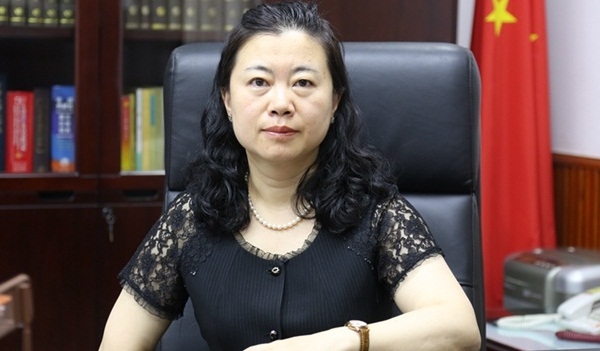
As the Chinese Ambassador to Ghana, I always at my leisure flip through some books on Ghana to seek wisdom and inspiration from the Ghanaian culture. Recently I read a book titled Bu Me Bε: Proverbs of the Akans, in which a proverb left me with a deep impression: that is, “If things are getting easier, maybe you’re headed downhill”.
My thoughts drift to China’s economy, which is now under the spotlight of the global community. China, once a closed and backward agricultural economy, has gradually established a comprehensive industrial system; become a member of the World Trade Organisation (WTO) and deeply merged into the world economy; and then grown to be the second-largest economy and largest trading partner for nearly 130 nations.
It is by no means smooth sailing, but rather an uphill, thorny and struggling journey. The current moderation of China’s economic growth, as well as the recent fluctuations of China’s stock market and currency exchange rate, have aroused wide concerns — with some forces degrading China’s economic prospects and preaching the collapse of China’s economy, or deeming China as a source of risk for the world economy.
Actually, judging from statistics of the first half of 2015, China’s economy despite the slowdown is within a proper range. The growth rate of 7 percent is still at the top of major economies in the world. More importantly, China’s economic structure has chalked up significant improvements. Today the services sector already accounts for half of China’s GDP, and consumption contributes 60% to its growth.
The growth rate of per capita disposable income outruns that of GDP. New growth impetus, especially the Internet-based economy, is in full swing. The assertions that China’s economy is in decline or on the brink of collapse are unconvincing. In the same period China contributed around 30 percent of the world economy’s growth, making the claims that China is a source of risk for the world economy neither objective nor reasonable.
The concerns of the global community over the slowdown of China’s economy lend credence to China’s critical role in maintaining the steady development of the world economy. During the global financial crisis that erupted in 2008, China contributed 50 percent of world economic growth, making it a key engine for global growth and earning itself a laurel as “the stabilising anchor”. In 2014, China contributed 25 percent of the world’s economic growth.
Given the weak recovery and increasing uncertainties of the world economy, as well as the accumulated and fermented anxiety engulfing the global market, it is understandable that the world is placing high, sometimes excessive, expectations on China. However, against the backdrop of a slack global economy, nearly all the developing and emerging economies are tackling the slowdown…China not being spared.
The Chinese government, in dealing with the complex domestic and international situation, resolutely made a scientific conclusion that China’s economy has entered a stage called “new normal”; assiduously turning the adversities into opportunities and striving for more balanced, inclusive and sustainable development.
Domestically, we vigorously promote reforms on economic structure; ensure that the market plays a decisive role in allocating resources, unleashing the internal impetus and vigour of the market; and advance mass entrepreneurship and innovation to foster new engines for economic growth. We also accelerate the transformation of governmental functions to build a service-based government that provides more public goods and services, and to establish a market system featuring equality, fairness and openness.
On the international stage China will open wider to the rest of the world, forge a more balanced and inclusive global industrial chain through global cooperation to pool the comparative strengths of all countries; and foster a global community of common interests and development. Now China’s economic structural reform is bearing fruit and delivering benefits. We are confident and capable of continuing our glorious track-record and further contributing positive energy to global development.
Africa always holds an important and special position in the architecture of China’s external cooperation. Now, China and Africa — Ghana included — have enjoyed unprecedentedly close relations with China-Africa cooperation contributing to 20 percent of Africa’s growth. However, concerns arise that China’s demand for Africa’s raw materials and primary products will decline; its trade with Africa, investment and aid to Africa will shrink.
As a diplomat engaged in African affairs for around 20 years, I always insist on assessing Africa’s development and China-Africa cooperation from a developmental and long-term view. It is my belief that China-Africa cooperation, despite minor adjustments, still maintains good momentum and will embrace bright prospects
First, we have sound principles and policies to guide China-Africa cooperation. During his visit to Africa in 2013, H.E. Chinese President Xi Jinping put forward the guidelines on China’s relations with Africa featuring sincerity, real results, affinity and good faith; and advocated a more balanced approach in upholding justice and pursuing interests, indicating that China in carrying out cooperation with Africa will never take the colonial path or damage the environment and sacrifice long-term interests of Africa, but rather seek mutually-beneficial cooperation.
China, taking into account the most extensive and urgent demand of African countries and the new stage and features of China-Africa cooperation, has identified industry, finance, poverty reduction, ecological and environmental protection, cultural and people-to-people exchanges as well as peace and security, as the six key areas for carrying out cooperation projects, and proposed to build with African countries high-speed railway networks, highway networks and regional aviation networks in Africa to facilitate the industrialisation of Africa.
With the guidance of these principles and policies that are welcomed by African countries, China-Africa relations are developing on the right track; the bilateral cooperation upgrading and concept of a China-Africa community of common destiny taking deep root in the hearts of our people.
Secondly, we have strong institutions to safeguard China-Africa cooperation. The Forum on China-Africa Cooperation (FOCAC), as an effective platform for collective dialogue and pragmatic cooperation, has brought about surmounting development in our cooperation. The China-Africa trade volume has surged from some US$10billion in 2000 to US$221.9billion in 2014. Meanwhile, the China-Ghana trade volume has increased from less than US$100million to US$5.6billion. China, while making great contributions to bridging the infrastructure deficits, creating job opportunities and reducing poverty in Africa through follow-up actions of FOCAC, also generates demonstrable effects and thereby catalyses the “rediscovery” of Africa and increases resources-inputs into Africa by the international community.
At the 2006 FOCAC Beijing Summit, China and Africa established a new type of strategic partnership featuring political equality and mutual trust, win-win economic cooperation and cultural exchanges — thus turning a new page in China-Africa friendly cooperation. In December this year, the FOCAC Summit will take place in South Africa. It is the first-ever on the African continent.
China will use this opportunity to put forward a series of new proposals to strengthen win-win cooperation with Africa in the five priority areas of industrialisation, agricultural modernisation, public health, cultural and people-to-people exchanges, as well as peace and security. Moreover, China will support Africa to establish an independent and sustainable industrial system, a food security and guarantee system, as well as a public health prevention and control system, thereby fuelling Africa’s development.
Thirdly, we are enjoying unprecedented opportunities in conducting China-Africa cooperation. African countries are eager to strive for economic transformation, replace the low-value-added development mode characterised by over-reliance on exports of raw materials and primary products, speed up industrialisation and enhance capacities to fend off economic and financial risks.
China has stepped into a more mature stage of industrialisation. It is the world’s largest producer of over 220 categories of industrial products, with abundant surplus capacity that is competitive, advanced and green — which speak to the very needs of Africa. The international cooperation on industrial capacity and equipment manufacturing promoted by China, which is conducive to the transformation of Africa’s development and upgrading of China-Africa cooperation, has brought unprecedented opportunities for Africa’s efforts in realising its dream of industrialiation.
Ghana is an important partner of China in carrying out industrial capacity cooperation. Ghana is endowed with a highly open market, well-educated workforce, geographical advantage and a relatively good foundation for development. Ghana is pursuing industrialisation and an export-oriented strategy. Introducing competitive industry capacity from China can complement Ghana’s inner-growth approach, diversify its development, and buttress the backbone and risk-resistant capacity of Ghana’s economy. We will, abiding by the principles of balancing interests and principles, win-win cooperation, openness and inclusiveness, and market-oriented operation, push more projects conforming to Ghana’s need to be implemented in the country.
Similar to the Ghanaian culture, the Chinese culture asserts that “Difficulty and hardship is the nurse of greatness”. Now, China, Africa and Ghana are all at a critical stage of development, and going through profound economic and social transformation. As reliable friends and sincere partners, we should tackle various challenges in the process of the global economy’s recovery with concerted efforts, and make new contributions to the development of Africa and the world.
Author: Sun Baohong










